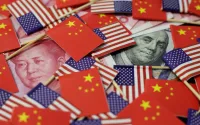16 November 2005Alexander Cockburn and Jeppfrey St. Clair
It's been a devastating fall for what are conventionally regarded as the nation's two premier newspapers, the New York Times and the Washington Post. The Times's travails and the downfall of its erstwhile star reporter, Judy Miller, have been newsprint's prime soap opera since late spring and now, just when we were taking a breather before the Libby trial, the Washington Post is writhing with embarrassment over the multiple conflicts of interest of its most famous staffer, Bob Woodward, best known to the world as Nixon's nemesis in the Watergate scandal.
On Monday of this week Woodward quietly made his way to the law office of Howard Shapiro, of the firm of Wilmer, Cutler, Pickering, Hale and Doar, and gave a two-hour deposition to Plamegate prosecutor Patrick Fitzgerald, a man he had denounced on tv the night before Scooter Libby's indictment as "a junkyard dog of a prosecutor".
Woodward's deposition had been occasioned by a call to Fitzgerald from a White House official on November 3, a week after Libby had been indicted. The official told Fitzgerald that the prosecutor had been mistaken in claiming in his press conference that Libby had been the first to disclose the fact that Joseph Wilson's wife [ie Valerie Plame] was in the CIA. The official informed Fitzgerald that he himself had divulged Plame's job to Woodward in a mid-June interview, about a week before Libby told Miller the same thing.
Seeing his laborious constructed chronology collapse in ruins, weakening his case against Libby, Fitzgerald called Woodward that same day, November 3. Woodward, the Washington Post's assistant managing editor, no doubt found the call an unwelcome one, since he had omitted to tell anyone at the Post, up to and including editor Len Downie and publisher Donald Graham, that he'd been the first journalist to be on the receiving end of a leak from the White House about Plame. He'd kept his mouth shut while two of his colleagues, Walter Pincus and Glenn Kessler had been hauled before Fitzgerald.
Shortly after the call from Fitzgerald. Woodward told Downie that he would have to testify. On Wednesday the Post carried a somewhat acrid news story along with Woodward's account of his testimony. Later in the day Howard Kurtz posted a commentary on the Post's website. It's clear from the news story and Kurtz's piece that his colleagues find Woodward's secretive conduct unbecoming (Downie tamely said it was a "mistake") and somewhat embarassing, given all the huff and puff about Judy "Miss Run Amok" Miller's high-handed ways with her editors.
And just as Miller and her editors differed strongly on whether the reporter had told them what she was up to, so too did Woodward's account elicit a strenuous challenge from the Post's long-time national security correspondent, Walter Pincus.
In Woodward's account of his testimony (which he took care to have vetted and later publicly approved by the Post's former editor Ben Bradlee) he wrote that he told Fitzgerald that he had shared this information -- Plame's employment with the CIA -- with Pincus. But Pincus is adamant that Woodward did no such thing. When the Post's reporters preparing Wednesday's story quizzed him about Woodward's version Pincus answered, "Are you kidding? I certainly would have remembered that."
Pincus told Joe Stroup of Editor & Publisher later on Tuesday that he had long suspected that Woodward was somehow entangled in the Plame affair. After Fitzgerald was appointed special prosecutor in the fall of 2003 Woodward had gone to Pincus and asked his colleague, in Pincus's words, "to keep him out of the reporting, and I agreed to do that."
Like many others, the Washington Post's staff had vivid memories of Woodward's unending belittling of the whole Plame affair as something of little consequence,"laughable", "quite minimal". Woodward said it on the Larry King show the night before the indictments, almost as if he was trying to send Fitzgerald a message.
For months Woodward has been working on a book about Bush's second term. The White House, ecstatic at Woodward's highly flattering treatment of Bush in Plan of Attack and Bush at War (Washington's retort to the Harry Potter series), has been giving Woodward extraordinary access, confident that he will put a kindly construction on their disastrous handling of the nation's affairs.
Judy Miller was savaged for accepting what she claimed to be special credentials from the Pentagon in return for confidentiality. So what are we to say about Woodward, who is given special access and then repays the favor by belittling the Plame scandal, while simultaneously concealing his own personal knowledge of the White House's schedule on the outing of Valerie Plame?
Woodward did not disclose his potential conflict of interest while he was pontificating on the airwaves about the Plame affair but he also apparently succeeded in stifling an investigation into his own role by his colleague Pincus. He may have also placed Pincus in legal jeopardy with his testimony to Fitzgerald that he had informed Pincus in June of 2003 about Plame. Pincus had testified under oath to Fitzgerald in September of 2004 that his first knowledge of Plame's employer had come in a conversation with a White House source at a later date.
So who was Woodward's source and what was his motive in calling Prosecutor Fitzgerald the week after Libby's indictment to disclose that he had talked to Woodward before Libby began his own speed-dial leaking? Woodward says it wasn't White House chief of staff Andrew Card. He also says he went to see his source with 18 pages of questions, whose topics included yellowcake from Niger and the infamous October 2003 National Intelligence Estimate on Iraq's alleged WMD.
After this initial interview with a White House official in mid-June 2003, Woodward learned enough that when he saw two other White House staffers shortly thereafter he had the phrase "Joe Wilson's wife" among his questions. So the first official did the leaking. He could well have been vice president Cheney, since Woodward's interview took place exactly at the time that Cheney's office was buzzing with alarm after a call from Pincus telling them he was working on a story about Joe Wilson.
That afternoon Cheney informed Libby that Wilson's wife worked at the CIA. Libby spent the next week gathering a dossier on Plame. On June 23 Libby and Woodward talked on the phone. Woodward had the 18 pages of questions he'd already posed twice, and began to work his way through them. He says he can't recall Libby bringing up Plame's name.
It's our guess that Libby, eager to broach Plame's role to the Post's renowned investigative reporter, finally wearied on the endless questions, cut Woodward off and hastened off to lunch with Miller. Woodward claims he kept no notes, and so did Miller until her famous notebook with "Flame" in it turned up at the New York Times. All in all it was a bad leak day for Scooter, since Woodward wasn't working as a reporter but as historian-courtier, and Miller had been taken off the story by her editors.
If Woodward's first source was Cheney, why would the latter have called Fitzgerald on November 3? The admission by Cheney that he had spoken to Woodward could derail Libby's prosecution and also undercut possible charges of a breach of the Espionage act, by playing into the line Woodward took on the Larry King Show and elsewhere, that this was no dreadful affront to national security but indeed "gossip" and "chatter".
So much for the fortune's wheel. From Nixon's nemesis to Cheney's savior.






